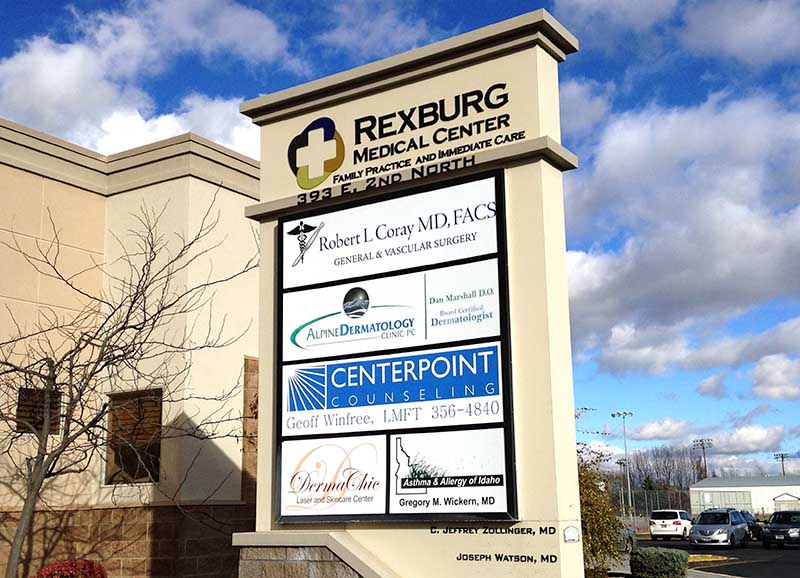Purchase of Rexburg Medical Center marks a growing trend in healthcare industry
Published at | Updated at
REXBURG — Madison Memorial Hospital’s recent purchase of Rexburg Medical Center signals a growing trend in the health care industry.
The hospital finalized its decision to buy the 45-year-old clinic in October after reaching an agreement with the Madison County Commission. The publicly owned hospital is overseen by Madison County.
What it means to you
Hospital officials said patients of the now-named Madison Memorial Rexburg Medical Clinic will hardly notice the change, and the prices and services will remain the same.
Hospital spokesman Doug McBride said no immediate plans exist to change the clinic’s budget or staff but wasn’t able to provide a long-term outlook.
“As far as right now, we are just kind of assessing and seeing what needs are there,” said McBride.
Why buy the clinic?
McBride said the decision to buy Rexburg Medical Center was based on a desire to adapt to the changing face of medicine.
“Primary care physicians are going to become much bigger players in this whole area of health care,” McBride said.
As more portions of the Affordable Care Act roll out, McBride believes that primary care physicians will serve as patients’ main point of contact within the health-care system, farming out tests and services to hospitals and clinics, whose specialists will communicate with physicians through teleconferencing and electronic health records.
“When we combine those types of things, then we are building on each other’s strengths and abilities,” McBride said. “Building these relationships right now is a steppingstone for the things we’re going to be seeing in the future.”
The purchase is an example of a larger regional and national trend, where hospitals grow by acquiring private practices. Troy Christensen, the chief financial officer at Madison Memorial, said these acquisitions are increasingly common in the hospital industry.
“As an industry, hospitals and clinics are integrating,” he said.
A history of integration
Madison Memorial started partnering with other medical facilities several years ago. In 2013, the hospital became affiliated with University of Utah Healthcare. Madison Memorial formed a similar partnership with Eastern Idaho Regional Medical Center in Idaho Falls and bought Seasons Medical in Rexburg in 2014.
Mountain View Hospital has also been taking part in the private-practice buying spree. Since 2010 the Idaho Falls hospital has acquired or formed affiliation agreements with seven private practices and medical clinics.
Like the executives at Madison Memorial, Mountain View’s leadership acquired the providers to prepare for changes spurred on by health-care reform.
“We thought that it would be good to get ahead of the curve,” said Joshua Tolman, chief administrative officer of Mountain View Hospital.
Coming to a provider near you: Payment based on outcomes, not services
One of the changes Tolman anticipates is the rise of accountable care organizations through the Affordable Care Act. In these organizations, health-care professionals are paid based on the outcomes they achieve for patients.
“The providers and the hospitals get paid just one bundled payment and then they split that up between the two of them,” he said.
Tolman said the type of reimbursement is different from the nation’s current pay-per-service model, in which providers are paid by how many services they provide. One common criticism of the pay-per-service model is that it creates an incentive for running unnecessary tests. The more procedures a patient undergoes, the more providers get paid.
But in accountable care organizations, providers are rewarded for providing better outcomes and partnering with their peers.
Streamlining health care through these organizations would theoretically result in less testing and greater efficiency.
Currently the Affordable Care Act incentivizes joining accountable care organizations through its Shared Savings Program.
More time for patients
For physicians, there are several different benefits behind this type of integrative health care.
Dr. Jeffrey Zollinger, the now-former owner of Rexburg Medical Center, believes partnering with Memorial Hospital will enable him to devote more time to caring for patients and less time attending to business matters.
“It frees up a lot of time to do what I like to do – to take care of patients,” said Zollinger.
He also said that being part of a large hospital system gives physicians access to better agreements with drug and equipment suppliers. In addition, doctors can cut costs by getting less costly insurance plans for their staff.
Will the hospital lose money?
Although joint ventures between hospitals and private practices may seem like sound business decisions, recent studies raise doubts about whether these partnerships really do result in financial gains.
A 2012 report by the Medical Group Management Association revealed that the median loss for employing a physician was $176,463. A 2013 poll conducted by the American College of Physician Executives said that 32 percent of health-care systems reported an increase in costs after purchasing private practices, while 5 percent reported a reduction.
These numbers can be distressing to taxpayers who don’t want to see the county hospital dip into the red.
However, McBride remains confident. He said Madison Memorial Hospital is already seeing positive returns from its purchase of Seasons Medical, and the hospital has never had to dip into taxpayer dollars because of its investments.
A strong future
For McBride, the future of health care is about collaboration.
“Building relationships with these physician’s offices helps to strengthen the community,” McBride said. “That’s why we do it at the hospital – to strengthen the base of our health care in Rexburg and Madison County.”




